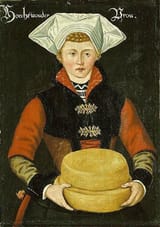Search results for "438206c0178bc3f3900ea6ff069f8fea" in md5 (2)
Anonymous
 8/18/2025, 4:55:10 PM
No.513371301
8/18/2025, 4:55:10 PM
No.513371301
>>513371223
>In the 13th and 14th centuries, the Dutch became skilled at reclaiming land from the sea by building dykes and creating polders, drained patches of reclaimed seabed. This led to dramatic improvements in cattle breeding and land maintenance. Farmers began having tremendous success crossbreeding livestock to develop cows that produced more milk—between the mid-16th and mid-17th centuries, the value of a Dutch cow quadrupled. The Dutch were starting to understand what best to feed cattle, and how best to cultivate pastureland. Soon, their cows were producing more than twice the yield of cows in neighboring countries
>Though at first unnoticed, a huge shift occurred in the European perception of the Dutch. Their country, which had broken off from Spanish rule in the 1590s, was rapidly changing from a former lowly possession of the Holy Roman Empire to an independent republic displaying a genius in art, science, and engineering. Seemingly overnight, the Netherlands became a global trading empire and leading maritime and economic power of the world. Suddenly, the cheese heads were considered brilliant
>All over Europe there were discussions and writings about what made the Dutch such geniuses. And those having these discussions often freely admitted that they had once thought of the Dutch as idiots who just drank milk and ate cheese. The Europeans also started recognizing that there was genius in Dutch dairy farms—in their better pastures, better cows, and ability to farm below-sea-level land. Dutch dairying, too, was now considered brilliant
Anonymous
7/27/2025, 12:54:34 AM
No.17874701
>>17874690
>In the 13th and 14th centuries, the Dutch became skilled at reclaiming land from the sea by building dykes and creating polders, drained patches of reclaimed seabed. This led to dramatic improvements in cattle breeding and land maintenance. Farmers began having tremendous success crossbreeding livestock to develop cows that produced more milk—between the mid-16th and mid-17th centuries, the value of a Dutch cow quadrupled. The Dutch were starting to understand what best to feed cattle, and how best to cultivate pastureland. Soon, their cows were producing more than twice the yield of cows in neighboring countries
>Though at first unnoticed, a huge shift occurred in the European perception of the Dutch. Their country, which had broken off from Spanish rule in the 1590s, was rapidly changing from a former lowly possession of the Holy Roman Empire to an independent republic displaying a genius in art, science, and engineering. Seemingly overnight, the Netherlands became a global trading empire and leading maritime and economic power of the world. Suddenly, the cheese heads were considered brilliant
>All over Europe there were discussions and writings about what made the Dutch such geniuses. And those having these discussions often freely admitted that they had once thought of the Dutch as idiots who just drank milk and ate cheese. The Europeans also started recognizing that there was genius in Dutch dairy farms—in their better pastures, better cows, and ability to farm below-sea-level land. Dutch dairying, too, was now considered brilliant

